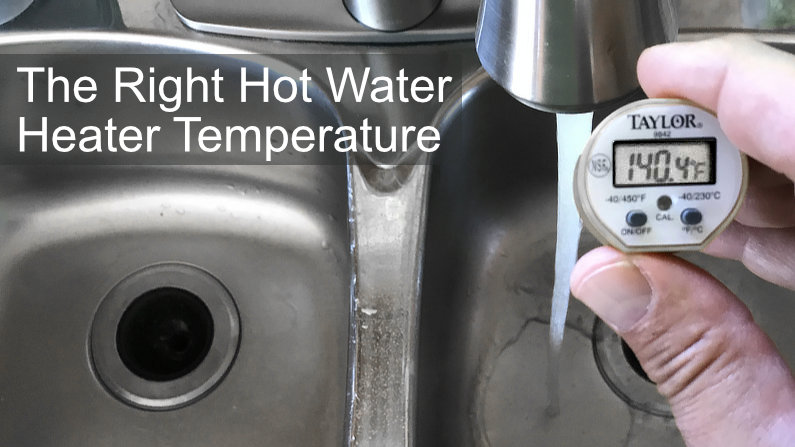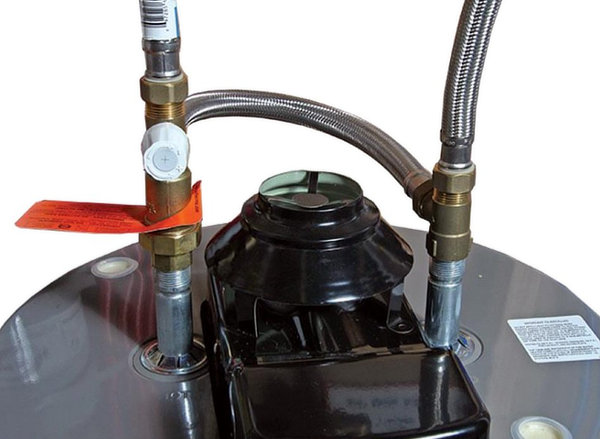Hot Water Heater Temperature | What’s Right & Why


Temperatures maintained below 140°F (60°C ) encourage growth of Legionella bacteria and other microorganisms!
There is an apparent misconception that keeping a hot water heater set at 120°F is the right or best temperature.
Wrong. Read on to discover why…
But you might ask, “What about hot water scalding at 140°F ?”
You should be concerned, especially if there are children in the house. In fact some codes won’t allow a plumber to set the hot water temperature higher than 120°F .
Quick answer: Set hot water tank to 140°F (I’ll explain why in a minute). Install a mix valve at the output of the water tank to bring it back down to 120°F . I have a recommendation at the end of this article.
Domestic hot-water systems are frequently linked to Legionnaires’ outbreaks.
Water heaters that are maintained below 60°C (140°F) and contain scale and sediment tend to harbor the bacteria and provide essential nutrients for commensal micro-organisms that foster growth of L. pneumophila.
To minimize the growth of Legionella in the system, domestic hot water should be stored at a minimum of 60°C (140°F)…
~ OSHA
Why Are Hot Water Heaters Set To 120 Degrees F?
You might be one (of many) who have heard that the best hot water temperature setting should be 120°F. So I investigated – why is that?
For one, setting the temperature lower does save some energy dollars. I’ve read on the order of 5 – 10% annual. Depending on your tank and usage, this may range from $25 to $50 savings per year. But is the risk worth it?
Another reason is for scalding safety, particularly if there are young children in the house. I get that. But read on…
The problem is, a water temperature of 120°F does NOT kill the Legionella bacteria.
What is Legionella?
Legionella is a type of bacteria that is found primarily in warm or hot water environments. These bacteria can cause Legionellosis.
Legionellosis comes in two forms, Pontiac fever, the lesser of the forms, and also Legionnaires’ disease which is a more severe multi-system illness with a deadly type of pneumonia.
Thousands of people get Legionnaires’ Disease in the United States each year. Of the approximated 2.4 million cases of pneumonia that that are diagnosed in hospital patients each year in the United States, about 18,000 cases are confirmed as Legionnaires’ Disease and up to 600,000 cases of Legionnaires’ Disease are misdiagnosed as pneumonia because the hospitals do not perform the tests for Legionella.
~ legionellaprevention.org
Prevent Leigonnaires While Minimizing Hot Water Scalding
If you do not have small children in the house who may accidentally scald / burn themselves with 140°F hot water, you might consider setting your hot water heater to 140°F. Simply get used to adjusting hot-cold at the faucet or shower as necessary. But there’s an even better way…
Another way to deal with this is as follows:
Set the temperature of the water reservoir (hot water heater) to 140°F but deliver the water at 120°F by way of a mixing valve. The mixing valve takes the hot water from the newly set heater (140°F) and mixes it with cold water until it can be released from the valve at a safe 120°F temperature.
Best Hot Water Mixing Valve for Hot Water Tank
In my opinion, this particular valve kit from “Cache Acme” (check it here) as pictured below is a easy-to-install solution to this problem. The reviews and recommendations look great.
It automatically adjusts (via internal thermostat) the amount of cold water to output 120°F.
I like (this accessory) which includes a shutoff valve.
If you can’t install a mixing valve kit yourself, no problem. I’m sure that a plumber won’t charge too much to get it done.
Here’s their spec sheet on this valve.

How To Measure Hot Water Temperature
After having adjusted your hot water heater temperature, wait until it has stabilized. A gas hot water heater heats up pretty quick. Electric may take a bit longer.
At your kitchen sink, turn on the hot water. Let it run long enough for the distribution pipes to achieve equilibrium (depends on distance from faucet to tank). Maybe a minute.
Use a fast acting temperature probe. Place the tip into the hot water stream. Wait until temperature readout settles down. Note the temperature. That’s it.
If you don’t already have a fast acting (instant read) meat thermometer for your grillin, here’s your excuse to get one.
Continue reading: Average Gallons of Water People Consume Each Day
